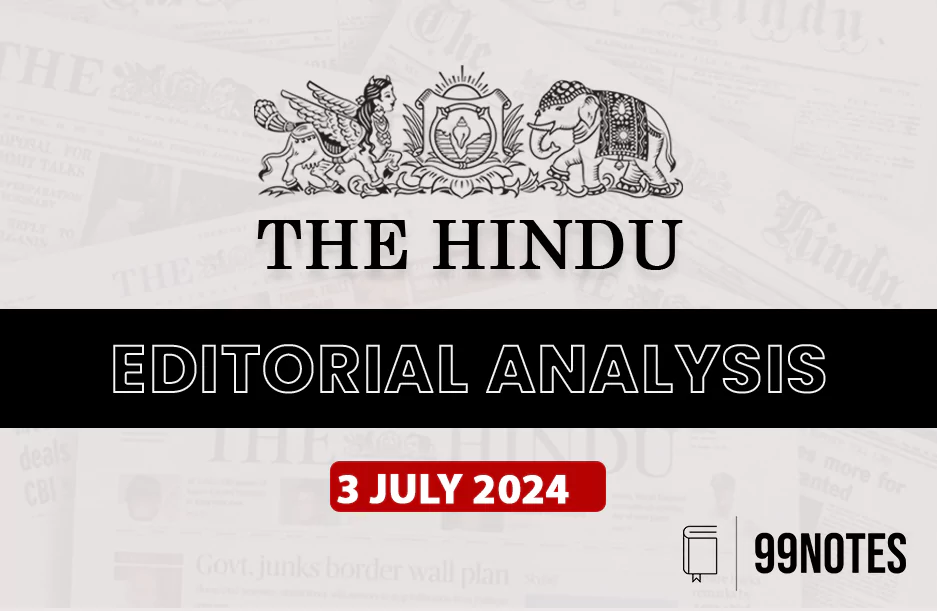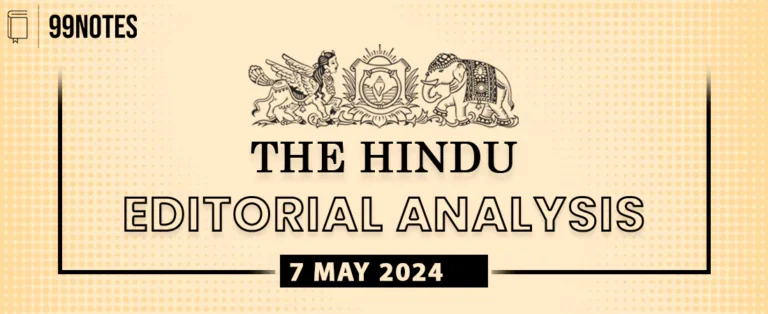3 July 2024 : The Hindu Editorial Analysis
1. Digital jurisprudence in India, in an AI era
(Source – The Hindu, International Edition – Page No. – 8)
| Topic: GS2 – Governance |
| Context |
|
Introduction to Generative AI
- Generative AI (GAI) is poised to revolutionise society with its transformative capabilities, yet existing legal frameworks designed for a pre-AI era face challenges in effectively regulating this rapidly evolving technology.
Safe Harbour and Liability Fixation
- The issue of fixing liability on intermediaries for content hosted by them is contentious.
- The Shreya Singhal judgement upheld Section 79 of the IT Act, granting intermediaries safe harbour protection, but its application to GAI tools remains ambiguous.
- Views differ on whether GAI tools should be treated as intermediaries or conduits, complicating liability assignment, especially in cases involving AI-generated content reposted by users.
Legal Challenges: Copyright Conundrum
- The Indian Copyright Act of 1957 currently does not provide explicit protection to AI-generated works, raising questions about revising existing provisions.
- Uncertainty persists on whether AI-generated works require human co-authorship and who should be recognized as the rightful copyright holder.
Privacy and Data Protection
- The K.S. Puttaswamy judgement and the Digital Personal Data Protection Act, 2023 introduced rights such as the right to erasure and right to be forgotten, yet challenges arise when applying these to AI models that retain absorbed data.
Proposed Solutions
- Learning by Doing: Implement a sandbox approach granting temporary immunity from liability to GAI platforms to foster responsible development and inform future regulations.
- Data Rights and Responsibilities: Overhaul data acquisition processes for GAI training to ensure legal compliance, possibly through revenue-sharing or licensing agreements with data owners.
- Licensing Challenges: Address the complexity of licensing data for GAI by creating centralised platforms similar to copyright societies, enhancing accessibility and ensuring data integrity.
Conclusion
- The legal landscape surrounding Generative AI necessitates a re-evaluation of existing digital jurisprudence. A cohesive approach and thoughtful interpretations by constitutional courts are crucial to harnessing the benefits of this technology while safeguarding individual rights.
| PYQ: Introduce the concept of Artificial Intelligence (AI). How does AI help clinical diagnosis? Do you perceive any threat to privacy of the individual in the use of Al in healthcare? (150 words/10m) (UPSC CSE (M) GS-3 2023) |
| Practice Question: Discuss the legal and regulatory challenges posed by Generative AI (GAI) in contemporary society. How can existing frameworks be adapted to effectively govern AI-generated content while safeguarding user rights? (250 Words /15 marks) |
2. France: India’s steady partner in green growth
(Source – The Hindu, International Edition – Page No. – 9)
| Topic: GS2 – International Relations – Bilateral Relations |
| Context |
|
Introduction:
- On July 14, 2023, President Emmanuel Macron and Prime Minister Narendra Modi elevated the ‘Partnership for the Planet’ as a key component of the Indo-French Horizon 2047 Roadmap.
- This partnership underscores deep cooperation on climate change, biodiversity, health, and sustainable development, epitomised by initiatives like the International Solar Alliance.
French Development Agency’s Role:
- The French Development Agency (AFD) Group, comprising AFD, Proparco, and Expertise France, implements France’s international partnership strategy.
- AFD focuses on harmonising development with Sustainable Development Goals (SDGs) through over 4,200 projects globally, with €13.5 billion approved in 2022 alone.
AFD’s Engagement in India:
- India is a priority for AFD, with over €4 billion committed since 2008 across strategic sectors: energy transition, urban development, biodiversity, and inequality reduction.
- 83% of AFD’s portfolio in India supports climate change mitigation and adaptation, with 63% contributing to gender equality initiatives.
Projects and Achievements:
- In 2023, AFD approved nearly €400 million for climate projects in India, including credit lines to public banks, disaster risk management in Himachal Pradesh, and urban water resilience.
- Environment protection projects include forest cover increase in Rajasthan, sanitation improvements in Himachal Pradesh, and solid waste management under CITIIS.
Infrastructure and Urban Development:
- Commissioned projects in 2023 include the Nagpur and Pune metro rails, showcasing Indo-French collaboration in urban transport infrastructure.
- A green credit line with the State Bank of India supports electric buses and energy-efficient housing initiatives.
Private Sector Initiatives:
- Proparco’s €11.2 million investment in Sahyadri supports sustainable farming practices benefiting 15,000 farmers in reducing losses and enhancing produce quality.
- A €33 million equity investment in Quadria aims to bridge healthcare gaps in underserved regions, highlighting private sector’s role in achieving SDGs.
Future Directions:
- Indo-French initiatives are expanding into the Indo-Pacific through biodiversity protection collaborations and a joint fund for scaling green technologies.
- Innovation is central to AFD’s strategy in India, focusing on solutions blending social inclusion and sustainability, particularly highlighted in the Indo-French Year of Innovation 2026.
Conclusion:
- The Indo-French partnership through AFD and Proparco underscores commitment to India’s sustainable development journey, emphasising resilience, equity, and innovation for a greener future.
| Practice Question: Discuss the significance of the ‘Partnership for the Planet’ between India and France in the context of sustainable development and bilateral cooperation, highlighting its implications for global environmental initiatives. (250 Words /15 marks) |




